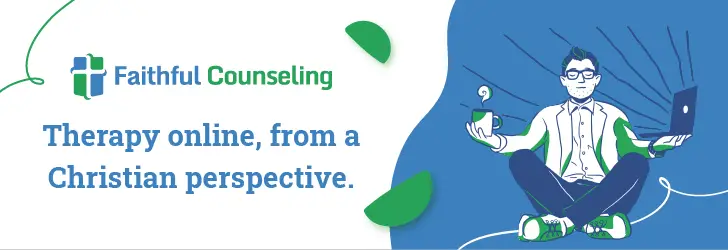As a BetterHelp affiliate, we receive compensation from BetterHelp if you purchase products or services through the links provided
Spiritual counseling is a unique approach to mental health and personal growth that incorporates an individual’s spiritual beliefs and practices into the therapeutic process. By tapping into a person’s sense of purpose, higher wisdom, and connection to something greater than oneself, spiritual counseling can help people navigate life’s challenges with grace and resilience.
At its core, spiritual counseling seeks to facilitate a deep exploration of the self and one’s relationship with the universe, ultimately helping people to find meaning and fulfillment in their lives. This holistic method addresses the whole person—emotional, mental, physical, and spiritual—resulting in genuine healing and transformation. As a powerful form of integrative therapy, spiritual counseling often complements other mental health treatments, providing an added layer of support for individuals seeking inner balance and improved well-being.
Key Takeaways
- Spiritual counseling addresses personal growth’s emotional, mental, physical, and spiritual aspects.
- It incorporates individual beliefs and practices into the therapeutic process.
- This approach complements other mental health treatments and provides an added support layer.
Fundamentals of Spiritual Counseling
The Concept of Spirituality
Spirituality encompasses an individual’s connection to a higher power, which may be a deity, the universe, nature, or their own inner spirit. This connection helps people find meaning and purpose, contributing to their well-being. Spiritual counseling addresses the aspect of spirituality in a person’s life, helping them tackle problems and issues from a spiritual perspective.
Purpose and Meaning in Life
A central focus of spiritual counseling is to help clients explore their sense of purpose and find meaning in their lives. This involves understanding an individual’s values, beliefs, and emotions contributing to their sense of self. Spiritual counseling can aid in aligning a person’s life with their core values, thus allowing them to pursue their desired purpose and find deeper meaning in everyday living.
Belief Systems and Values
In spiritual counseling, clients explore their belief systems, which are their thoughts and ideas about their spiritual identities. These belief systems, which can stem from religious or non-religious sources, offer a lens through which one can view the world. Recognizing and understanding one’s beliefs and values is crucial in spiritual counseling, as they guide an individual’s actions and shape their life experiences.
Incorporating these entities [spirit, meaning, purpose, spirituality, belief, religion, mind, value, belief system, belief systems, pastoral counseling, spiritual counseling] within a counseling session, spiritual counselors draw from diverse spiritual traditions and practices to help clients find balance and healing in their lives. By addressing spirituality in the context of their clients’ daily lives, counselors provide valuable insight into the relationship between mind, body, and spirit.
Different Approaches to Spiritual Counseling
Religious and Non-Denominational Approaches
In spiritual counseling, various approaches cater to individuals’ diverse beliefs and preferences. One such approach is the religious and non-denominational method. This approach incorporates elements of faith and spirituality stemming from different religious backgrounds, granting clients the freedom to explore and navigate their spiritual journey. The support offered by spiritual counselors in this approach can help individuals strengthen their connection with their chosen higher power, be it a specific deity or a broader spiritual force such as the universe.
Spiritual and Pastoral Counseling
Another approach to spiritual counseling is spiritual and pastoral counseling. This method often involves a pastor, clergy member, or a trained counselor from a particular religious denomination. Their role is to provide guidance and psychotherapy to individuals seeking help with mental health, relationships, and personal growth within the context of their faith. Clients can find healing through this type of counseling using their religious beliefs and practices.

Art, Dance, and Music Therapy
Art, dance, and music therapies offer different avenues to explore spirituality and healing through creative means. These forms of therapy enable individuals to express their emotions, thoughts, and experiences nonverbally. Art therapy, for example, involves using visual art materials and activities to foster emotional well-being, while dance therapy focuses on movement and physical expression. Music therapy, however, incorporates various aspects of music, such as listening, composing, and performing.
These alternative therapeutic approaches can be integrated into spiritual counseling to enhance healing. By engaging in creative practices, clients can tap into their inner world, gain insights into their lives, and connect with their soul or spiritual essence. Furthermore, practices such as yoga can be incorporated to promote peace, balance, and spiritual growth in the therapeutic setting.
In summary, spiritual counseling offers a range of approaches to address clients’ unique needs. By considering religious and non-denominational elements, pastoral care, and creative therapies, spiritual counselors can effectively support individuals in their quest for personal growth, spiritual well-being, and healing.
Roles and Responsibilities of Spiritual Counselors
Counselor and Therapist Qualifications
Spiritual counselors, also known as pastoral counselors, provide guidance and support to individuals looking to improve their spiritual wellness. These mental health professionals may come from various backgrounds, such as religious leaders, therapists, or psychologists. While the primary goal of spiritual counseling is to help clients find spiritual growth, these counselors must also be well-versed in mental health and mind and body connections.
To become a spiritual counselor, one must possess certain qualifications, such as a degree in psychology, counseling, or a related field. Additionally, they should have a strong understanding of various religious and spiritual practices and the skills necessary to facilitate compassionate discussions with their clients.
Ethics
A key aspect of spiritual counseling is adhering to a strict code of ethics. Spiritual counselors must respect their clients’ beliefs and choices, ensuring they do not impose their views upon them. Confidentiality is crucial; clients need to feel secure when sharing sensitive information. Spiritual counselors must also know their personal and professional boundaries while maintaining a non-judgmental and empathetic relationship with their clients.
Certification
For mental health professionals pursuing a career in spiritual counseling, obtaining certification can enhance their credibility and professionalism. Certification programs are available through organizations like the American Association of Pastoral Counselors. Completing these programs demonstrates a commitment to providing high-quality spiritual therapy and adhering to industry standards.
Training
Continuing education and training are essential for spiritual counselors to maintain their skills and stay updated on the latest techniques and methodologies. Numerous courses, workshops, and seminars cover spiritual wellness, mind and body connections, and religious practices. Participating in ongoing training enables spiritual counselors to continually enhance their abilities, demonstrate their dedication to the field, and better serve their clients on the journey toward spiritual growth.

Methods and Techniques in Spiritual Counseling
Meditation and Prayer
Meditation and prayer are commonly used in spiritual counseling to promote inner peace, mental clarity, and emotional well-being. Both practices help individuals connect with a higher power or their inner selves, fostering hope and resilience. Through meditation, individuals focus and quiet their minds, gaining awareness of their thoughts and emotions. Prayer allows people to express their hopes, fears, and gratitude to a higher power, which can provide comfort and guidance.
Journaling and Volunteer Work
Journaling is another beneficial technique for personal growth and self-reflection. Writing in a journal encourages individuals to explore their thoughts, emotions, and spiritual experiences, offering insight into their lives. Journaling also allows people to track progress, celebrate achievements, and identify improvement areas.
Volunteer work is often incorporated to practice empathy and altruism, which are essential for spiritual growth. Volunteering allows individuals to interact with and help others, promoting gratitude and a sense of satisfaction.
Mindfulness and Nature-Based Practices
Incorporating mindfulness into daily activities helps individuals develop self-awareness and cultivate empathy. Mindfulness practices, such as deep breathing and gentle exercise, focus on the present moment, encouraging individuals to acknowledge and accept their emotions and experiences without judgment.
Nature-based practices promote spiritual well-being, helping people feel connected to the natural world. Activities like outdoor meditation, hikes, and eco-therapy facilitate a connection with the environment and encourage individuals to find peace and balance in their natural surroundings.
Traditional and Philosophic Counseling
Traditional counseling techniques, such as active listening, empathy, and solution-focused approaches, can be integrated into spiritual counseling to support personal growth and emotional well-being. These methods provide the foundation for deep exploration of an individual’s spiritual belief system and its impact on their life.
Philosophic counseling draws on the wisdom of philosophy and different spiritual traditions, encouraging individuals to explore fundamental questions about life, meaning, and existence. Through open discussion, individuals can gain an expanded perspective on their spirituality and uncover answers to their questions and concerns.

Addressing Specific Issues with Spiritual Counseling
Depression and Anxiety
Spiritual counseling can provide support for clients experiencing depression and anxiety. By exploring clients’ beliefs and values, counselors can help them find meaning, purpose, and a sense of connectedness within themselves and the world. This approach may alleviate hopelessness and help clients manage their daily stressors more effectively.
In some cases, spiritual counseling can be combined with other therapeutic methods, such as cognitive-behavioral therapy, to target the root causes of anxiety and depression. This holistic approach ensures the clients’ mental health concerns are addressed on multiple levels.
Guilt and Forgiveness
Guilt and forgiveness are common issues clients bring to spiritual counseling sessions. Counselors work to help clients understand and process their feelings of guilt, recognize its source, and find ways to let go of self-blame. Often, this involves exploring the role of beliefs, values, and spiritual practices in their lives.
Forgiveness is a powerful aspect of spiritual healing. Counselors may use individualized tools and techniques to facilitate this process, enabling clients to release feelings of resentment, anger, and hurt. As a result, clients may experience greater inner peace and spiritual growth.
Self-Esteem and Resilience
Low self-esteem and a lack of resilience are challenges faced by many clients. Spiritual counseling seeks to help individuals develop a strong sense of self-worth and the ability to bounce back from difficult circumstances. Clients can strengthen their self-esteem and embrace their unique qualities by understanding the connection between their beliefs, values, and personal identity.
Resilience is fostered through spiritual practices and techniques that encourage clients to face life’s challenges with confidence and courage. In spiritual counseling, clients gain the tools to cultivate inner strength and foster emotional resilience in adversity.

Finding and Choosing a Spiritual Counselor
How to Find a Good Therapist
When searching for a spiritual counselor, finding someone who aligns with your values and beliefs is crucial. Seek recommendations from friends, family, or religious leaders in your community. You can also search online directories, such as those specific to your faith or denomination, to find spiritual therapists and counselors in your area. Be sure to research their credentials and read reviews to ensure you find someone who can effectively support your spiritual journey.
Spiritual Counseling Credentials
Before choosing a spiritual counselor, it’s essential to verify their credentials. Some may hold professional licenses or certifications in the counseling or therapy fields, such as licensed marriage and family therapists (LMFTs) or licensed professional counselors (LPCs), with a specialization in spiritual counseling. Additionally, you should look for a counselor endorsed by a religious organization or minister, demonstrating their commitment to spiritual and ethical values.
Spiritual Direction and Advisor Services
Spiritual counseling can address various topics and concerns, such as connecting with your higher power or overcoming barriers to faith. It’s crucial to identify what specific type of support you seek and find a counselor who offers those services. Some may offer spiritual direction, where they guide you through prayer, meditation, and reflection to deepen your relationship with your faith. Others may offer spiritual advising services, assisting in decision-making based on your religious values and beliefs.
Benefits of Spiritual Counseling
Improving Mental and Physical Health
Spiritual counseling can have a positive impact on mental and physical health. By addressing an individual’s core beliefs and exploring their spirituality, counselors can help clients develop coping strategies to face life’s challenges. People who engage in spiritual counseling may experience reduced anxiety, stress, and depression. These mental health improvements could also potentially contribute to better physical health, as there is often a link between mental and physical well-being.
Connection with Life Purpose and Personal Values
During spiritual counseling sessions, clients can explore their life purpose and personal values. By examining these aspects, individuals can better understand the direction they want to take in their lives. A meaningful life purpose can provide comfort and support during times of uncertainty and can motivate and inspire.
Enhancing Relationships and Support Systems
One of the key benefits of spiritual counseling is its ability to promote healthy relationships and support systems. By addressing underlying mental health concerns and fostering personal growth, spiritual counseling encourages the development of healthy connections with others. It may involve addressing past traumas, improving communication skills, or being more open and vulnerable with loved ones. As a result, individuals can experience more fulfilling relationships and a stronger sense of belonging within their social networks.
FAQs
What is spiritual counseling?
Spiritual counseling is a form of guidance that aims to help individuals explore their spirituality, beliefs, and personal growth. It focuses on emotional and psychological well-being, emphasizing the mind, body, and spirit connection.
How is spiritual counseling different from traditional therapy?
Traditional therapy mainly addresses psychological and emotional issues, while spiritual counseling goes beyond that to consider one’s spiritual beliefs and journey. Spiritual counselors understand that spiritual concerns can significantly impact an individual’s overall well-being.
Who can benefit from spiritual counseling?
Anyone seeking to understand their beliefs, discover inner peace, or address issues related to personal growth, life purpose, and spiritual awakening can benefit from spiritual counseling. It is suitable for people of all faiths and belief systems.
Is spiritual counseling based on a specific religion?
No, spiritual counseling is not tied to any specific religious tradition. It is a holistic approach that honors the unique spiritual journey of each individual. Counselors may have their faith background but work with clients from diverse beliefs and ideologies.
What can I expect in a spiritual counseling session?
In a spiritual counseling session, the counselor will listen actively to your concerns, ask relevant questions, and help you explore your beliefs, experiences, and goals. The session may include tools like meditation, mindfulness exercises, or journaling to help you connect with your inner self. Each session is tailored to the individual’s unique needs and objectives.
How long does it take to see results from spiritual counseling?
The duration and commitment required for spiritual counseling depend on the individual’s situation, needs, and goals. It is essential to be patient and remain open to the process, as results may vary from person to person. Regular sessions and self-reflection can bring about meaningful improvements in one’s spiritual well-being and overall quality of life.
- How Having Cybersecurity Protection Helps You Relax - April 25, 2025
- 8 Reasons Why Spending Time Outside Calms You Down - April 25, 2025
- 5 Helpful Ideas for Managing Stress During a Plumbing Emergency - April 24, 2025
This site contains affiliate links to products. We will receive a commission for purchases made through these links.





